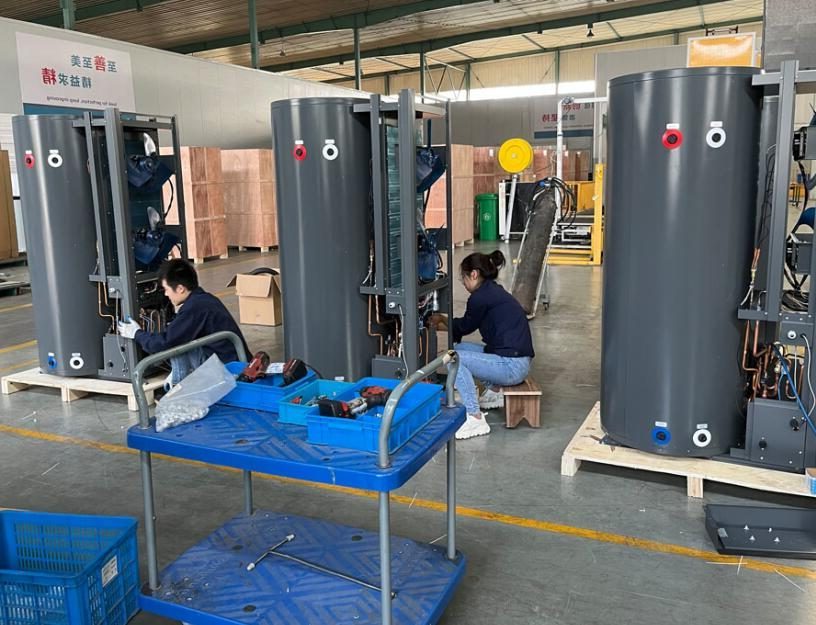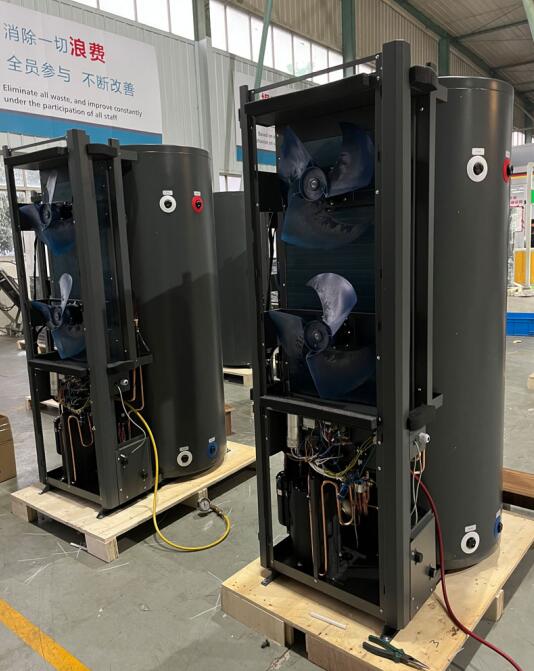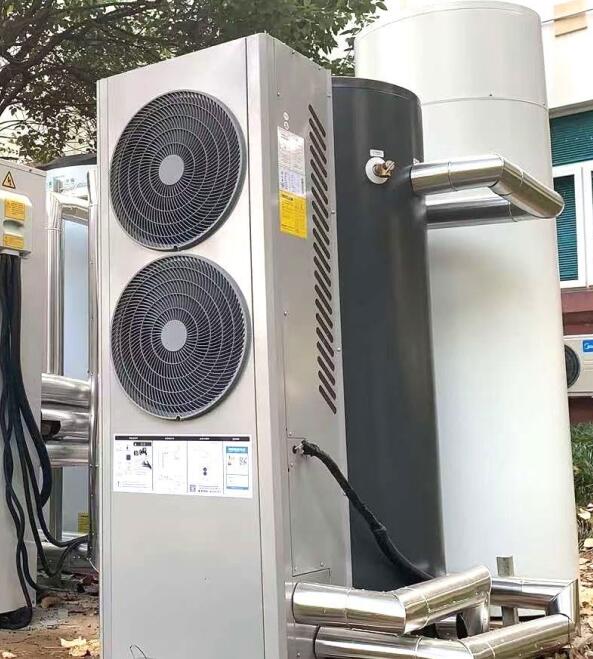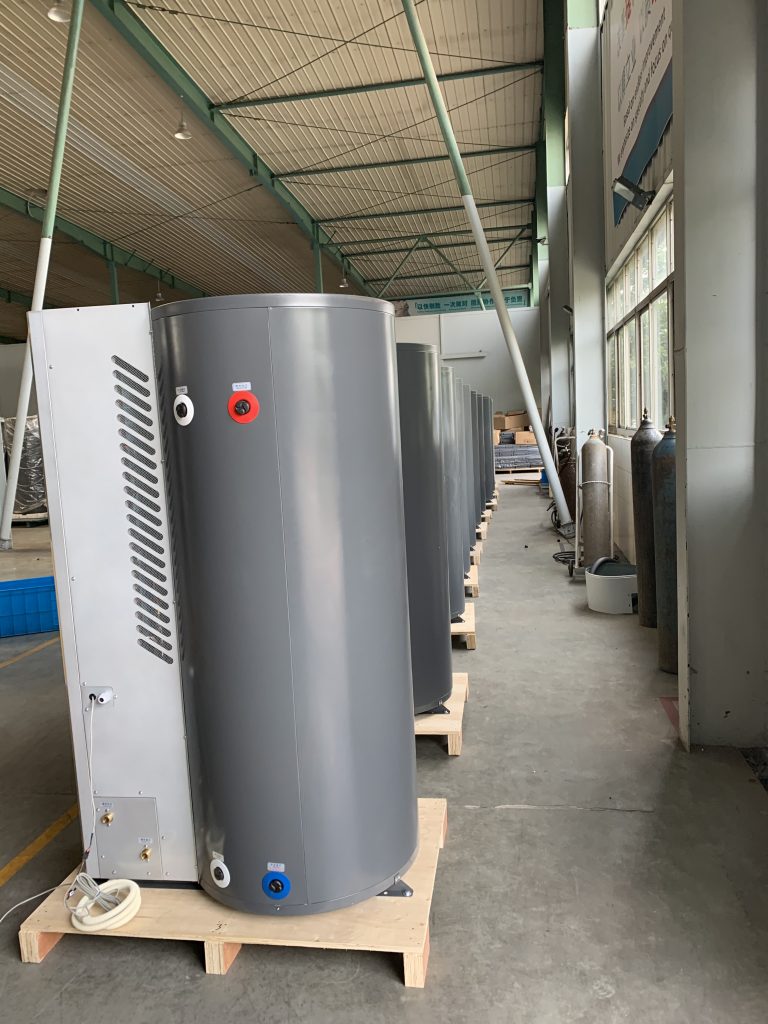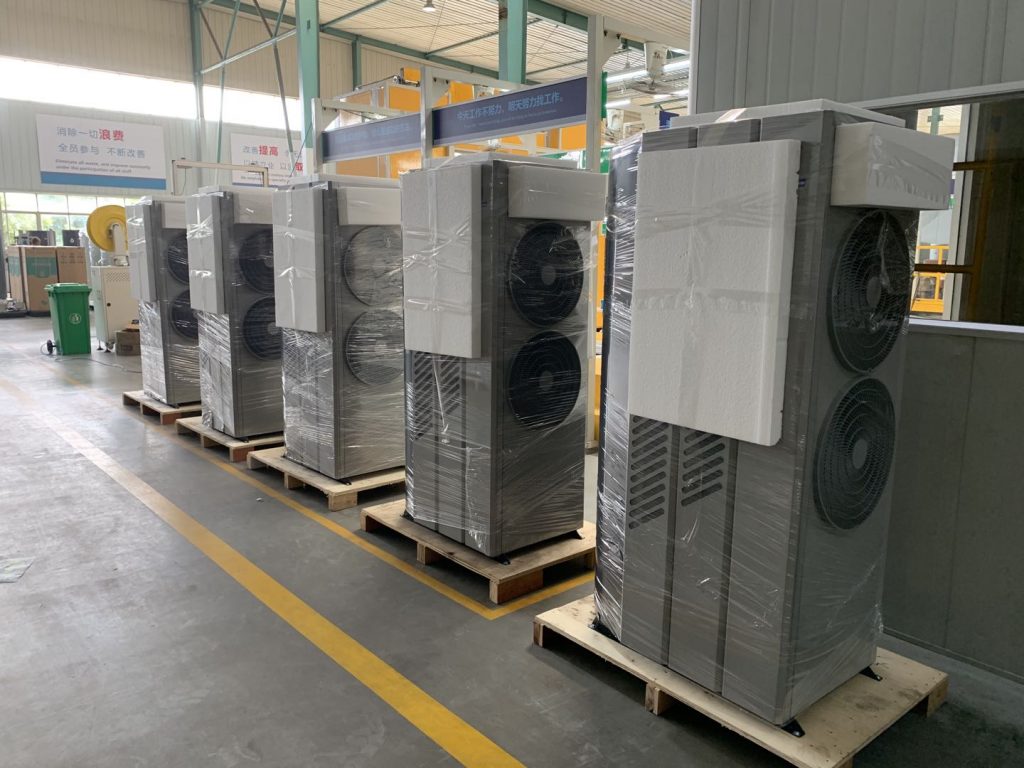Air to water heat pump R134a refrigerant have become increasingly popular in recent years due to their high energy efficiency and low environmental impact. According to a case study conducted by the European Commission, air to water heat pumps using R134a had a COP of 3.2, making them highly efficient at transferring heat from the outdoor air to the water used for heating.
Additionally, R134a has a low global warming potential and ozone depletion potential, making it a more environmentally friendly option. While there are alternative refrigerants available, R134a remains a cost-effective and reliable choice for air to water heat pump systems. In this blog, we will explore the benefits of using R134a in air to water heat pump systems and how it can help reduce energy consumption and carbon emissions.
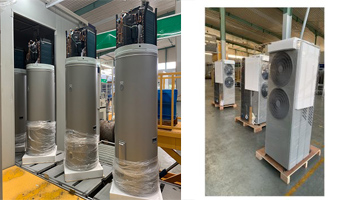
- Posa integrale o divisa opzionale
- Tecnologia del sistema di riscaldamento a due stadi
- Può funzionare a una temperatura ambiente di -35°C
- Funzioni: Acqua calda a 80℃, riscaldamento della casa/acqua calda domestica, disinfezione dell'acqua
- Sicurezza ad alto COP e risparmio energetico
- Tecnologia ad alte prestazioni a basse temperature ambientali
- Tecnologia di sbrinamento intelligente
• Multiple protection, long service life
• Efficient EEV control
•Flexible installation
•High return on investment
•Applications in various projects
•High efficiency FANTASTIC custom heat exchanger
• High efficiencyAnti-freeze and frost design at the bottom of special rebreather
| Modello | KRS118B–350V | KRS118B–420V |
| Capacità del serbatoio | 350L | 420L |
| Materiale del serbatoio interno | Acciaio smaltato (Acciaio BTC340R, spessore 2,5 mm) | Acciaio smaltato (Acciaio BTC340R, spessore 2,5 mm) |
| Involucro esterno | Acciaio zincato verniciato | Acciaio zincato verniciato |
| Pressione di esercizio nominale del serbatoio | 0,8MPa | 0,8MPa |
| Grado di impermeabilità | IPX4 | IPX4 |
| Condensatore | Scambiatore di calore a microcanali | Scambiatore di calore a microcanali |
| Potenza dell'elemento elettrico | 2500W | 2500W |
| Ingresso nominale della pompa di calore | 1300W | 1300W |
- House heating, Old house with radiator and replacing old gas heater or electric heater.
- Apartment, Vilas, Hotel.
- Hospital or workshop special using.
- Dairy farm, electric plating factory.
- Food disinfection, drying, laundry, and so on.
Quanto costa la pompa di calore aria-acqua?
in reality, electric powered Air-source water heaters account for an average of 18 percent of your electricity expenses, in line with strength.gov. electric heat pump water heater The older your water heater the less power green its miles.
Se ogni famiglia all'interno degli Stati Uniti utilizzasse uno scaldacqua a pompa di calore (sotto i cinquantacinque galloni), il risparmio sulle spese di energia sarebbe pari a $eight,2 miliardi di dollari all'anno, secondo la megastar delle energie rinnovabili.
Gli scaldacqua a pompa di calore (ibridi) costano da $1.200 per i serbatoi da 50 galloni a $2.500 per i serbatoi da 80 galloni prodotti dai migliori produttori. sicurezza della vostra casa Le dimensioni del serbatoio e l'eccezionalità del prodotto influenzano maggiormente il costo dell'unità. A partire dal 2021, la temperatura iniziale dell'acqua del comune scaldacqua a resistenza da 50 galloni costa $400, mentre un normale scaldacqua a pompa di calore da 50 galloni costa $1100.
Si consiglia di far installare lo scaldacqua a pompa di calore ad alta temperatura da un esperto per massimizzare l'efficienza elettrica del sistema di riscaldamento a due stadi. Secondo HomeAdvisor, per i produttori cinesi di scaldacqua a pompa di calore nuovi, il costo di installazione dello scaldacqua è di circa $seven hundred-$900.
What is R134a and how does it work in air to water heat pump systems?
R134a is a hydrofluorocarbon refrigerant that is commonly used in air to water heat pump systems. It is a popular choice due to its high energy efficiency, thermal stability, and low environmental impact. R134a works by absorbing heat from the outdoor air and transferring it to water, which is then circulated through the building’s heating system.
A case study conducted by the European Commission found that R134a is an effective refrigerant for air to water heat pump systems. The study examined the performance of R134a heat pumps in a residential building in Spain over a period of three years. The results showed that the heat pumps were able to maintain comfortable indoor temperatures while reducing energy consumption and greenhouse gas emissions.
In addition to its performance benefits, R134a is also widely available and relatively inexpensive compared to other refrigerants. It has a low ozone depletion potential and a global warming potential of only 1,300, which is significantly lower than other refrigerants like R410A.
What are the benefits of using R134a in air to water heat pump systems?
There are several benefits to using R134a in air to water heat pump systems. First and foremost, R134a has a high energy efficiency rating, meaning it can effectively transfer heat from the outdoor air to the water used for heating. This can result in lower energy bills and reduced carbon emissions.
Furthermore, R134a has a low environmental impact compared to other refrigerants. It has a low global warming potential and ozone depletion potential, making it a more environmentally friendly option.
A case study conducted by the European Commission found that air to water heat pumps using R134a had a COP of 3.2, meaning they were able to produce 3.2 units of heat for every 1 unit of energy consumed. This is a highly efficient rating, and demonstrates the effectiveness of R134a in air to water heat pump systems.
Overall, the benefits of using R134A High Temperature Air Source Heat Pump systems include high energy efficiency, low environmental impact, and cost-effectiveness.
Are there any alternatives to using R134a in air to water heat pump systems?
Yes, there are several alternatives to using R134a in air to water heat pump systems, including R407C, R410A, and R32. These refrigerants may offer higher energy efficiency or lower environmental impact, but also have their own set of advantages and drawbacks that must be considered.
La pompa di calore Hair to Water è più costosa?
the common 50-gallon resistance high energy efficiency charges $four hundred, while a air cooled heat pump 50-gallon water heater costs $1100.environmental value of the unit but, this wholesal air water heat pump water heater price have lower operating prices, and the common residential consumer can save a complete $800 on their energy payments after 4 years.
Can you use R134a in a heat pump?
Medium-sized and large heat pumps commonly utilize R134a as the refrigerant. However, compared to NH3 (Ammonia), R134a has lower performance capabilities. This is due to its relatively low pressure, which results in a higher volume that the compressor needs to handle. As a consequence, R134a is not particularly cost-effective in terms of efficiency.
Can I use R134a instead of HFC 134a?
As evident from the information provided, R134a and HFC134a are two distinct substances, yet they possess virtually identical physical properties and can be used interchangeably. Both R134a and HFC134a have a zero ODP (Ozone Depletion Potential) value, indicating that they do not contribute to the depletion of the ozone layer.
Air to water heat pump r134a Photos & Videos
una pompa di calore aria-acqua è più economica di un riscaldatore
Compared to all other common forms of heating, important a air-to water hot water heat pump is the most energy-efficient and cheapest heating system to run.
Disadvantages of a air to water heat pump r134a?
Hpwhs requires a relatively long time to heat a volume of water to a Heat Temperature. In order to avoid falling behind demand, especially during peak periods, most hpwhs are also equipped with trad.
Common refrigerant for commercial heat pumps
Most heat pumps use R134a or tetrafluoroethylene, R-410a or difluoromethane + pentafluoroethane, and R-744 or CO 2 or plain carbon dioxide.
Potrebbe piacerti:

